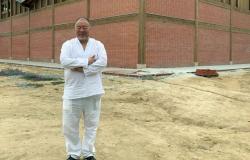The Chilean writer María José Navia He communicates via Zoom from his attic in some Santiago neighborhood: it is the refuge where he reads and writes daily. The library seen behind brings together only a part of the many books in her house, as expected of a reader who defines herself as voracious. This “little window” is also the one that projected her image during the years of pandemicwhile he was giving classes to his students at the University, or where he meets every month to talk in the reading club that coordinates. A room of his own where, he says, he is happy and happiness is what writing gives youeven when Write about sad, sordid or dystopian topics.
First of all, Navia feels like a reader. His stories are the result or overflow of his readings. And only from time to time, when she publishes a book or attends a Fair, does she put herself in the role of writer.
“I find that The place of the Fairs is very important in the ecosystem of books. The experience of sitting, having the reader arrive, dedicating the book is a very beautiful ritual. I take it super seriously and I’m quite ridiculous about it: she brought pencils, a little stamp with which I stamp the books, take time to make a long dedication, let them ask you things, generally very respectful and affectionate exchanges, which give you back that dimension of your book,” he says. And the dialogue begins with Clarín Culture.
–You also have an active participation in https://twitter.com/mjnavia/status/1220707422764965888.
-I think that the conversation about books goes through many places, not only the university, the academy, or traditional paper newspapers, but also in digital publications, reading clubs, book recommenders on Instagram, on YouTube. For me, as a writer, what interests me is getting closer to readers, and social networks allow this exchange. I am also interested in how people are constructed on social networks because it is another fiction, not because it is a lie. Fiction is not a lie: it is a construction. What one highlights on social networks is not all of life.
–Reading on paper or digitally?
–My love for books is in any format: I am a big supporter of audiobooks, an experience that allows you to continue reading at times when you couldn’t. And a big fan of e-books, sometimes it is easier to access a digital book than on paper: there are many independent publishers that may not be able to distribute in all countries, but you can get them digitally, or on subscription platforms. . It was said that the paper book was going to disappearbut that is not going to happen for now.
–In your stories, technology usually appears in a dystopian or addictive way.
–The books come out sadder than I would like, but there are always little windows of light. Cell phones and technologies allow us to communicate, they saved us in the pandemic, but yes I think it has that addictive componentas in “Careful” (A future music), but I did not invent anything, because technology addiction recovery centers exist because the issue is becoming a problem. I want to hold on to the good things that technology brings, without minimizing that it allows abuse, bullying, many horrible things, like everything, but trying to rescue the positive. It may sound very self-help, but I think if you keep reading, there is hope.
–You participate in the Dialogue at a table about stories. Throughout your books you shaped a particular way of writing and thinking about short stories. Certain connections of themes, characters, as constellations or as in Kintsugi, a novel that works with the idea of making the cracks visible, following the Japanese technique. How did that process go?
–For me the most I like to write stories, my favorite genre of writing, and reading. It is a very rich, little-recognized format with which you can do many things. I obsessively study stories that have worked with something I am writing, for example, ghost stories. I am not here to invent anything in the story genre.: neither the dystopian story, nor the technological one, nor the connected story. I’m part of this conversation that comes more from the English tradition, the idea of connected stories. In the case of KintusgiThat for me It is a novel in storieswhere the characters of a family grow and we accompany them, started from a story from a previous book, Placebecause I wanted to know more about those characters. In A future music There are relationships with technology, and characters from other books are repeated. And in Everything we learned from the moviesthe movies are the link, but there is the same haunted house that appears in three stories in three different situations, there are characters that are also repeated, I like that complicity that occurs. Now that I am finishing a novel, the most difficult thing was finding a different way of working, because it is not the same to correct story by story: I read the entire novel.
–And how did you come to the novel?
–A story appeared, I started writing it, I realized that “this is big, this is long, these are not stories,” and here I go. It was so difficult for me that in the meantime I started writing stories, so I already have another book that dialogues with that novel. I have a lot of fun writing, honestly.
–In your stories, there is a rescue of certain ties that are observed in a different light, ties that are not blood, perhaps random or ephemeral, or the figure of uncles. What interests you about those relationships?
–What I call “almost” links are other ways of relating or loving each other that are not typical. The family has long-term ties, I liked those more ephemeral links, inspired by those of my favorite movie, Lost in translation: fleeting, neither friends, nor lovers, nor family, very important for both, but “almost” family, couples, friends. when I was writing Kintusgi I was an aunt for the first time and a love that I didn’t know appeared, I wanted to look in books for what was happening to me. And I realized that there wasn’t that much: I always saw sisters, mother and daughter, grandmother and granddaughter. But there was no aunt and niece. In Kintsugi There is an epigraph by Piglia that says that “The family is a machine for generating fiction about itself,” and for me, family, in addition to people, are a way of beingspeak, communicate, tell each other everything or nothing, along the lines of Family lexicon by Natalia Ginzburg, that is the fiction that interests me.
–You dedicated a book to your love of cinema.
–Everything we learned from the movies It was a book that I wrote during the pandemic at home, isolated, surrounded by my books and watching movies. For me, I go to the movies with the best views and in the pandemic, I genuinely thought maybe movies were over. It also seemed to me that we were all becoming movies for others, seeing each other through the screen. And that is also a story: a framework, a little piece of our lives. Movies taught me how to look, to point your camera at different things, I learned a lot: the small gesture, the intimate. Other directors such as Isabel Coixet, or Sara Polley, or the cinema of Wong Kar-Wai, in In the spirit of loving; that type of links, that subtlety, that is the camera that I would like to use. The pandemic was a process that clearly transformed us, also made us reevaluate our priorities: people who left their jobs, their partners. It worked to put many things in crisis too. I think there are going to be many movies and projects about haunted houses coming out, for example. And I hope that cinema always has a place in people’s lives.
–Can you imagine any of your stories being made into a film?
–Of course, I dream that one day it can happen.
María José Navia will be this Monday at 5:30 p.m. at table VI of the Dialogue of Writers of Latin America, with Sérgio Rodrigues (Brazil), Virginia Mórtola (Uruguay), María José Navia (Chile), Alejandra Kamiya (Argentina). It will be in the Alfonsina Storni room.







